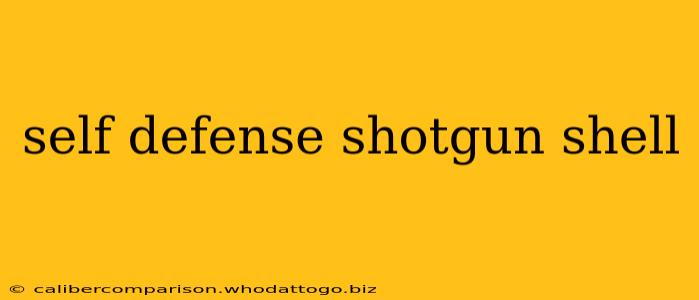Choosing the right ammunition for self-defense is a critical decision, and for shotgun owners, selecting the appropriate shell is paramount. This guide will delve into the specifics of self-defense shotgun shells, helping you make an informed choice that prioritizes safety and effectiveness. We'll explore different shell types, gauge considerations, and crucial factors to consider when equipping yourself for home protection.
Understanding the Importance of Ammunition Selection
The shotgun's versatility lies in its ability to use various shell types, each designed for different purposes. While hunting shells focus on range and penetration of game, self-defense shells prioritize stopping power at close range, minimizing overpenetration, and reducing the risk of collateral damage. Selecting the wrong ammunition can have serious consequences, leading to insufficient stopping power or, conversely, excessive harm beyond the intended target.
Key Considerations for Self-Defense Shotgun Shells
Several factors determine the effectiveness of a self-defense shotgun shell:
1. Gauge: The Size Matters
Shotgun gauges refer to the diameter of the barrel. Smaller numbers indicate larger diameters (e.g., 12 gauge is larger than 20 gauge). 12-gauge shotguns are the most common for home defense due to their readily available ammunition and powerful stopping power. However, 20-gauge shotguns offer a lighter recoil, making them a viable option for smaller individuals or those sensitive to recoil. The choice depends on your physical capabilities and comfort level.
2. Shot Type: Buckshot vs. Birdshot vs. Slugs
-
Buckshot: This is the most popular choice for home defense. Buckshot shells contain multiple larger pellets (typically 00, 000, or 0000 buck), delivering significant stopping power at close range. The larger the number of "0"s, the larger the pellets.
-
Birdshot: While effective against small game, birdshot is generally not recommended for self-defense due to its limited stopping power at self-defense ranges. The smaller pellets spread rapidly, losing effectiveness quickly.
-
Slugs: Shotgun slugs are single projectiles, offering the greatest range and penetration. While effective, slugs present a higher risk of overpenetration, making them less ideal for home defense in densely populated areas.
3. Payload and Pattern: Accuracy at Close Range
The pattern of the shot—how the pellets spread after leaving the barrel—is crucial. At close range, a tight pattern isn't essential, but excessive spread can also be detrimental. You want enough pellets to hit the target effectively while minimizing the chance of stray pellets hitting unintended objects or people.
4. Reduced-Recoil Ammunition: Managing Recoil
For individuals concerned about recoil, reduced-recoil ammunition is available. These shells often use lighter shot or different propellant types to reduce the force of the recoil. This is particularly beneficial for smaller individuals or those new to shotguns.
5. Non-Lethal Options: Consideration for Specific Situations
While not a primary focus for self-defense, non-lethal options, such as beanbag rounds or rubber buckshot, may be considered in specific situations where the goal is to subdue an attacker without causing serious injury. However, always check your local laws and regulations regarding the use of less-lethal ammunition.
Choosing the Right Shell for Your Needs
Ultimately, the best self-defense shotgun shell is a matter of personal preference and careful consideration of your specific circumstances. Factors like your physical strength, living environment (e.g., apartment vs. house), and comfort level with recoil all play a crucial role. Consult with experienced firearms instructors and local law enforcement to make a well-informed decision.
Disclaimer: This information is for educational purposes only. Always consult with a firearms expert and your local law enforcement before making any decisions about self-defense ammunition. Safe firearm handling and responsible gun ownership are crucial.

